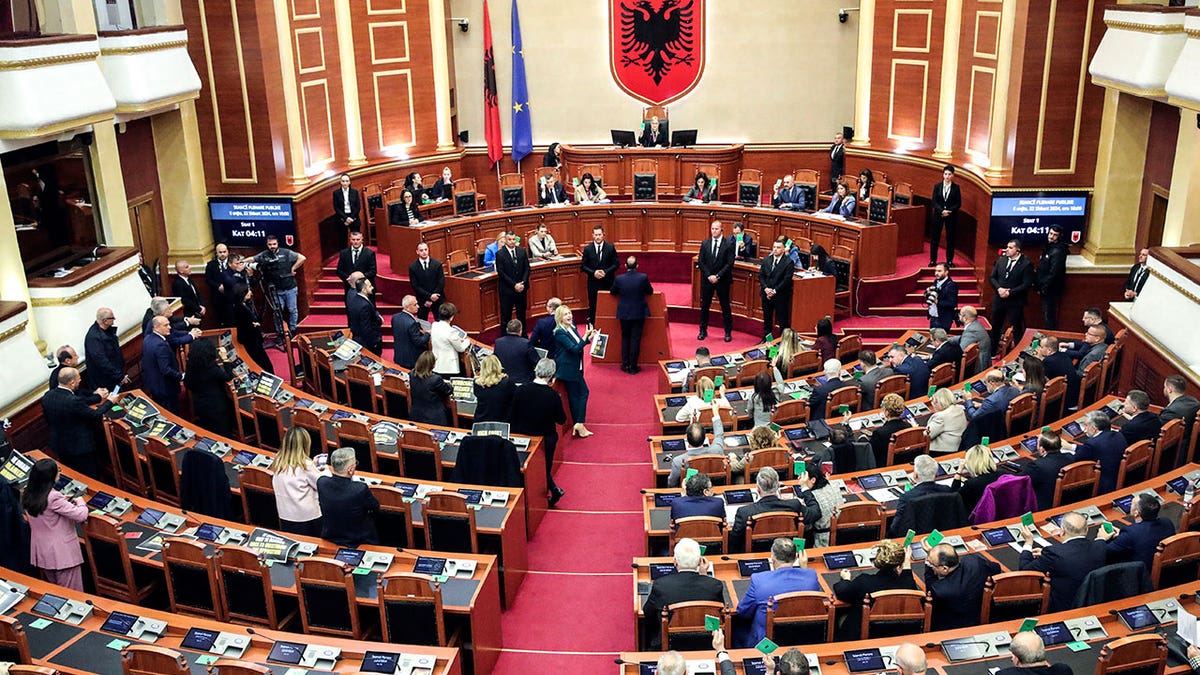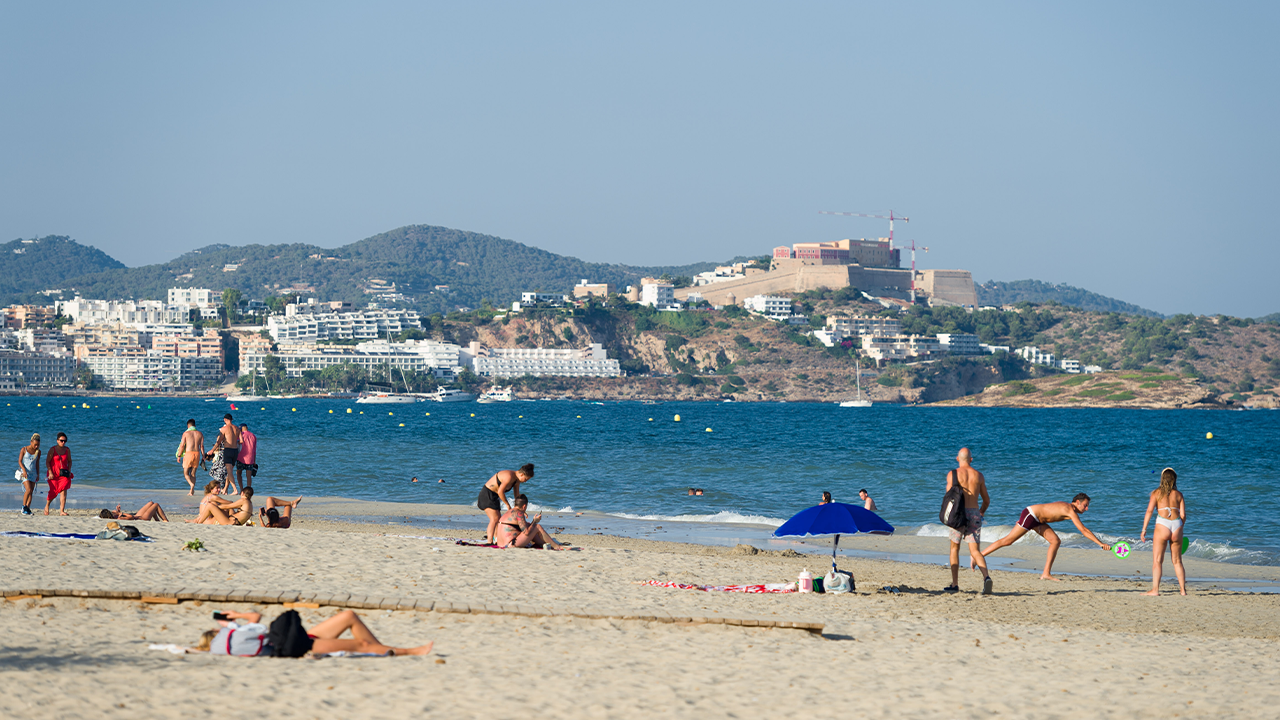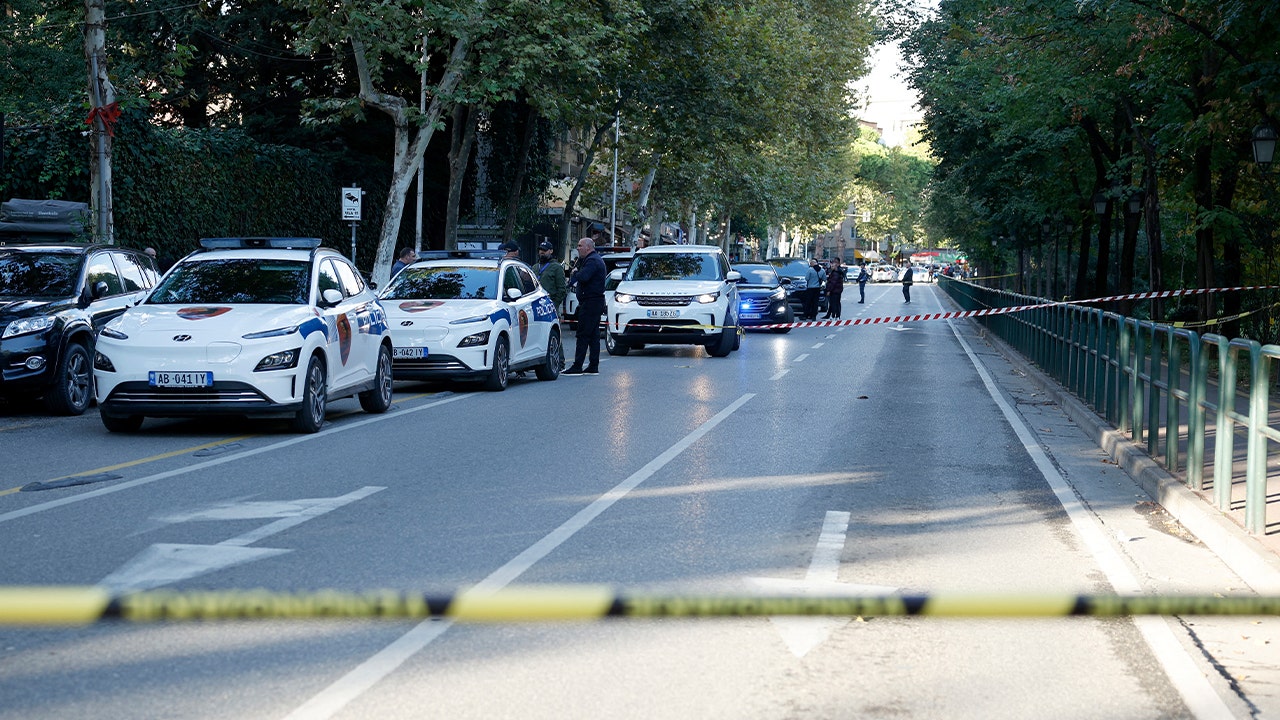NEWYou can now listen to articles!
On Oct. 6, Albanian Appeals Court Judge Astrit Kalaja was shot inside the Tirana courtroom where he oversaw a property dispute case, according to the International Commission of Jurists. Kalaja died of his wounds, and two others were injured in the shooting. The 30-year-old suspect has been arrested.
Kalaja’s killing quickly became a lightning rod for nationwide dissatisfaction with the Albanian judiciary.
Former Albanian Ambassador to the United States and the United Nations Agim Nesho told Digital that reforms implemented almost a decade ago by the European Union and the U.S. were “intended to strengthen the rule of law,” but have been “transformed into a political instrument, undermining democratic institutions and concentrating power in the hands of the executive.”
SOROS V TRUMP: SOCIALISTS TARGETS CONSERVATIVES IN UPCOMING EUROPEAN NATION’S ELECTION
Police secure the perimeter outside Tirana Appeal Court after a judge was shot dead, in Tirana, on Oct. 6, 2025. A man on trial opened fire in a courtroom in the Albanian capital Tirana, killing Appeals Court Judge Astrit Kalaja, who was presiding over the man’s case when the man opened fire, police said. (Adnan Beci/AFP via Getty Images)
“As a result,” Nesho said, “the public’s confidence in the justice system has severely eroded, with institutional dysfunction reaching a level where some segments of society feel driven to take justice into their own hands — a dangerous sign of democratic backsliding.”
Opposition Democratic Party leader Sali Berisha told Digital that Kalaja’s killing was “an abominable act and an alarm bell that should not be ignored.”
MEET RAMADURO: EUROPE’S PROGRESSIVE SOROS-TRAINED AUTOCRAT AND ENEMY OF TRUMPISM
Berisha said that the “evident support that the act has garnered,” including the creation of a now inactive GoFundMe to support the killer’s legal rights, demonstrates “protest against a dysfunctional judiciary, against a corrupt and politicized judicial system.”
Berisha said judicial reforms “left the country without a Constitutional Court and without a High Court for more than five years,” creating a “staggering backlog” of around 200,000 cases. He said that the process of vetting judicial personnel turned into “a witch-hunt against magistrates that were perceived [to be] independent or potentially right-leaning.” According to Berisha, this led to the “weaponization of the judiciary against the opposition.”

Lawmakers of the Democratic Party, left, look on as their colleagues of the ruling Socialist party vote in Tirana, Albania, Feb. 22, 2024. (Armando Babani/AP Photo)
A 2020 report on U.S. assistance to Albania describes American and EU efforts to “restore the integrity of the Albanian justice system.” The report states that USAID assisted the High Court with creating a procedure to manage 72% of its 35,000 backlogged cases. It also stated that 125 of 286 judges and prosecutors put through vetting procedures had “been dismissed for unexplained wealth, ties to organized crime, or incompetence,” while 50 judges chose to resign rather than go through vetting.
EX-ALBANIAN PRESIDENT WARNS BIDEN THAT RUSSIA SEEKS TO ‘UNDERMINE EUROPEAN VALUES AND FOUNDATIONS’ IN REGION
Berisha claimed that in the aftermath of reforms, it now takes about 15–20 years for the resolution of legal disputes. “Justice delayed is justice denied,” Berisha said.
Lawyer Besnik Muçi, formerly a prosecutor and a judge in the Constitutional Court of Albania, told Digital that judicial reforms aimed “to establish a credible, fair, independent, professional, service-oriented justice system that is open, accountable and efficient.” He said that the Albanian justice system “has failed in almost all” parameters.
Muçi said the courts’ backlog consists of about 150,000 cases. He also noted that the closure of five appeal courts and some district courts has “almost blocked the citizens’ access to justice.” He also explained that most court buildings do not “meet…the security conditions and standards necessary.”
“Citizens do not believe in the justice system,” Muçi said.

Then Albanian President Ilir Meta holds an American flag as he delivers a speech during a rally in Tirana, on March 2, 2020. Thousands of Albanians rallied on March 2, 2020 against the country’s left-wing government and Prime Minister Edi Rama, responding to a call from the president who accuses him of violating the constitution. (Photo by Gent Shkullaku/AFP via Getty Images)
After Kalaja’s murder, the Korça Bar Association and National Bar Association of Albania boycotted court proceedings on Oct. 9 and 10. Korça Bar Association Director Nevzat Tarelli told Albanian news station CNA that Kalaja’s killing highlighted the need for increased security for and trust in judicial personnel. He also said that “people who expect justice in a timely manner, if they do not receive it, no longer have faith in justice.”
Engjëll Agaçi, general secretary of Albania’s Council of Ministers, did not respond to Digital’s questions about nationwide discontent with the judiciary or the size of Albania’s court case backlog.
CLICK HERE TO GET THE APP
A State Department spokesperson declined to respond to questions about the success of U.S.-backed judicial reform efforts in Albania or address the issues that Kalaja’s killing has highlighted.
“We offer our deepest sympathies to the victims of this attack and their families and strongly condemn the use of violence against judges and prosecutors,” the spokesperson said.












